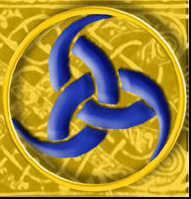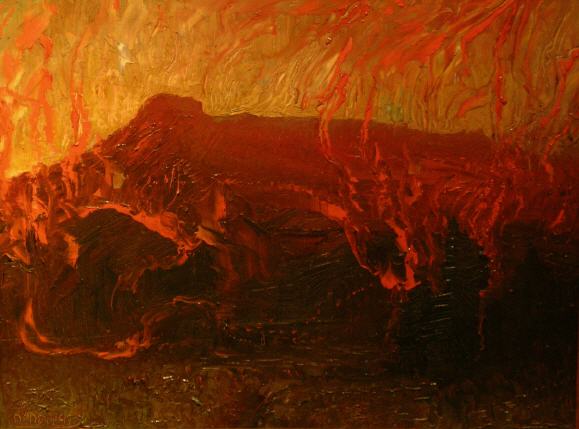
Terms of
Use
Submissions
~ Historical & Classical Poetry ~
Composed toward the end of the
first millennium, Beowulf is the classic Northern epic
of a hero's triumphs as a young warrior, killing the monster Grendel and its
mother,
and his fated death as a defender of his people.
Translation from Anglo-Saxon in alliterative verse by Francis Barton Gummere (1855 - 1919).
Find
the whole poem here.
Excerpts from various chapters, selected for their beauty
of language
(words in brackets by me, dots indicate omissions by me).
XVI (A
funeral pyre for Hnaef and other fallen warriors)
........
Oaths were given, and ancient gold
heaped from hoard. -- The hardy Scylding,
battle-thane best, on his balefire lay.
All on the pyre were plain to see
the gory sark, the gilded swine-crest,
boar of hard iron, and athelings many
slain by the sword: at the slaughter they fell.
It was Hildeburh's hest, at Hnaef's own pyre
the bairn of her body on brands to lay,
his bones to burn, on the balefire placed,
at his uncle's side. In sorrowful dirges
bewept them the woman: great wailing ascended.
Then wound up to welkin the wildest of death-fires,
roared o'er the hillock: heads all were melted,
gashes burst, and blood gushed out
from bites of the body. Balefire devoured,
greediest spirit, those spared not by war
out of either folk: their flower was gone.
XVIII (Courtly gift-exchange)
A cup she gave him, with kindly greeting
and winsome words. Of wounden gold,
she offered, to honor him, arm-jewels twain,
corselet and rings, and of collars the noblest
that ever I knew the earth around.
Ne'er heard I so mighty, 'neath heaven's dome,
a hoard-gem of heroes, since Hama bore
to his bright-built burg the Brisings' necklace,
jewel and gem casket. --
.................
XX (Hrothgar mourns Aeschere, who was killed by
Grendel´s mother)
Hrothgar spake, helmet-of-Scyldings: --
"Ask not of pleasure! Pain is renewed
to Danish folk. Dead is Aeschere,
of Yrmenlaf the elder brother,
my sage adviser and stay in council,
shoulder-comrade in stress of fight
when warriors clashed and we warded our heads,
hewed the helm-boars; hero famed
should be every earl as Aeschere was!
But here in Heorot a hand hath slain him
of wandering death-sprite. I wot not whither,
proud of the prey, her path she took,
fain of her fill. The feud she avenged
that yesternight, unyieldingly,
Grendel in grimmest grasp thou killedst, --
seeing how long these liegemen mine
he ruined and ravaged. Reft of life,
in arms he fell. Now another comes,
keen and cruel, her kin to avenge,
faring far in feud of blood:
so that many a thane shall think, who e'er
sorrows in soul for that sharer of rings,
this is hardest of heart-bales. The hand lies low
that once was willing each wish to please.
..............
XXI (Beowulf responds to Hrothgar´s mourning)
BEOWULF spake, bairn of Ecgtheow:
"Sorrow not, sage! It beseems us better
friends to avenge than fruitlessly mourn them.
Each of us all must his end abide
in the ways of the world; so win who may
glory ere death! When his days are told,
that is the warrior's worthiest doom.
Rise, O realm-warder! Ride we anon,
and mark the trail of the mother of Grendel.
No harbor shall hide her -- heed my promise! --
enfolding of field or forested mountain
or floor of the flood, let her flee where she will!
But thou this day endure in patience,
as I ween thou wilt, thy woes each one."
XXII (Beowulf promises to kill Grendel´s mother, and
bequeathes his possesions in case he should fall)
BEOWULF spake, bairn of Ecgtheow: --
"Have mind, thou honored offspring of Healfdene
gold-friend of men, now I go on this quest,
sovran wise, what once was said:
if in thy cause it came that I
should lose my life, thou wouldst loyal bide
to me, though fallen, in father's place!
Be guardian, thou, to this group of my thanes,
my warrior-friends, if War should seize me;
and the goodly gifts thou gavest me,
Hrothgar beloved, to Hygelac send!
Geatland's king may ken by the gold,
Hrethel's son see, when he stares at the treasure,
that I got me a friend for goodness famed,
and joyed while I could in my jewel-bestower.
And let Unferth wield this wondrous sword,
earl far-honored, this heirloom precious,
hard of edge: with Hrunting I
seek doom of glory, or Death shall take me."
XXXII (Beowulf recounts: By accident, one of king
Hrethel´s sons killed his brother.
The deed remains unavenged, for:)
..............
Too awful it is for an aged man
to bide and bear, that his bairn so young
rides on the gallows. A rime he makes,
sorrow-song for his son there hanging
as rapture of ravens; no rescue now
can come from the old, disabled man!
Still is he minded, as morning breaks,
of the heir gone elsewhere;[3] another he hopes not
he will bide to see his burg within
as ward for his wealth, now the one has found
doom of death that the deed incurred.
Forlorn he looks on the lodge of his son,
wine-hall waste and wind-swept chambers
reft of revel. The rider sleepeth,
the hero, far-hidden;[4] no harp resounds,
in the courts no wassail, as once was heard.
[3] gone elsewhere: died [4] far-hidden: in his grave
XXXV (Beowulf, fighting a dragon to
defend his folk, is mortally wounded)
Beowulf spake in spite of his hurt,
his mortal wound; full well he knew
his portion now was past and gone
of earthly bliss, and all had fled
of his file of days, and death was near:
"I would fain bestow on son of mine
this gear of war, were given me now
that any heir should after me come
of my proper blood. This people I ruled
fifty winters. No folk-king was there,
none at all, of the neighboring clans
who war would wage me with 'warriors'-friends'
and threat me with horrors. At home I bided
what fate might come, and I cared for mine own;
feuds I sought not, nor falsely swore
ever on oath. For all these things,
though fatally wounded, fain am I!
From the Ruler-of-Man no wrath shall seize me,
when life from my frame must flee away,
for killing of kinsmen! Now quickly go
and gaze on that hoard 'neath the hoary rock,
Wiglaf loved, now the worm lies low,
sleeps, heart-sore, of his spoil bereaved.
And fare in haste. I would fain behold
the gorgeous heirlooms, golden store,
have joy in the jewels and gems, lay down
softlier for sight of this splendid hoard
my life and the lordship I long have held."
XXXVII (Wiglaf sees both Beowulf and the dragon lying
dead)
IT was heavy hap for that hero young
on his lord beloved to look and find him
lying on earth with life at end,
sorrowful sight. But the slayer too,
awful earth-dragon, empty of breath,
lay felled in fight, nor, fain of its treasure,
could the writhing monster rule it more.
For edges of iron had ended its days,
hard and battle-sharp, hammers' leaving;[1]
and that flier-afar had fallen to ground
hushed by its hurt, its hoard all near,
no longer lusty aloft to whirl
at midnight, making its merriment seen,
proud of its prizes: prone it sank
by the handiwork of the hero-king.
.........
(Wiglaf chides Beowulf´s other men-at-arms that they failed to help their
lord)
.......
To rescue his life, 'twas little that I
could serve him in struggle; yet shift I made
(hopeless it seemed) to help my kinsman.
Its strength ever waned, when with weapon I struck
that fatal foe, and the fire less strongly
flowed from its head. -- Too few the heroes
in throe of contest that thronged to our king!
Now gift of treasure and girding of sword,
joy of the house and home-delight
shall fail your folk; his freehold-land
every clansman within your kin
shall lose and leave, when lords highborn
hear afar of that flight of yours,
a fameless deed. Yea, death is better
for liegemen all than a life of shame!"
Image: "Die schlafende Brünhilde" (Sleeping Brynhild), Hermann Hendrich (1854-1931), German painter
